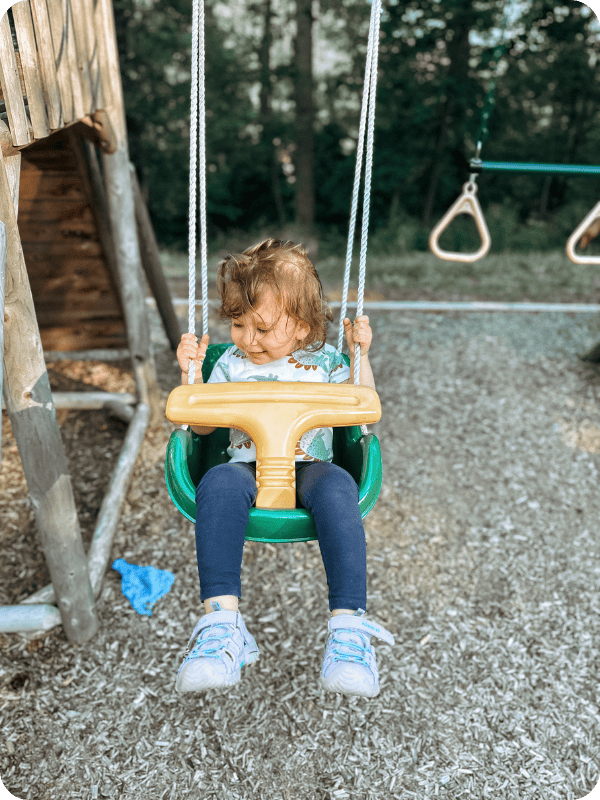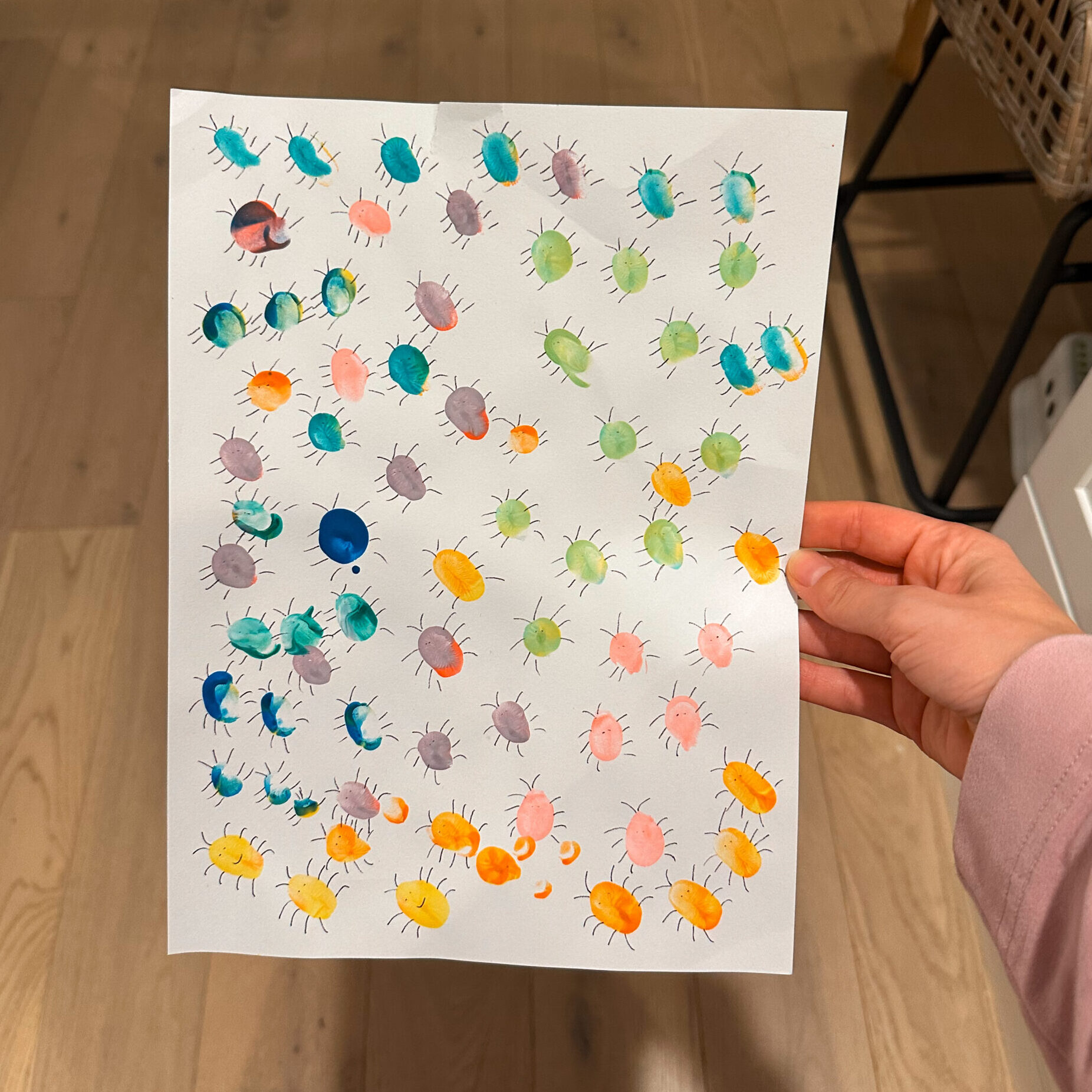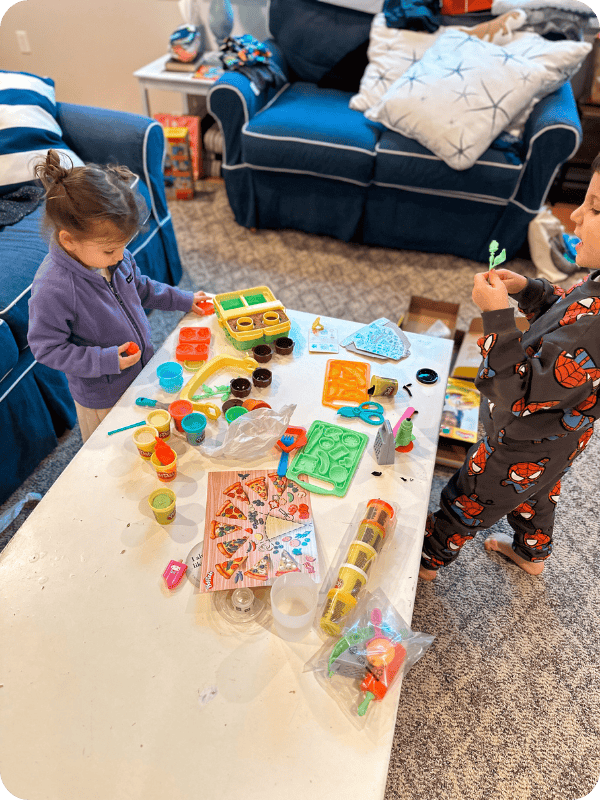Last Updated on August 28, 2025 by Jordyn Koveleski Gorman
This page contains affiliate links. We will receive a commission on qualifying purchases using these links.
As your little one inches closer and closer to a year of age, you’re probably anxiously awaiting to hear that first true word. (And if you’re a mom, you’re probably hoping it sounds like “mama!”). We expect a first, true, independent word by the end of 12 month of age.
First let’s define what counts as a word: any sound or sound combination that is consistently produced to represent something. It is said unprompted and independently. Some examples are “ba” for “ball,” “dada” for “daddy,” “wa” for “water.” Words like animal sounds (“neigh, moo”) and environmental sounds (“vroom, beep”) also count if said independently! The word itself doesn’t have to be perfect, it just has to be consistent and independently produced (i.e., produced without you saying, “say ball!” or prompting them to imitate you). Essentially the word has to come from them- when they see an object or person and they INITIATE verbally by trying to say a word, that’s it!
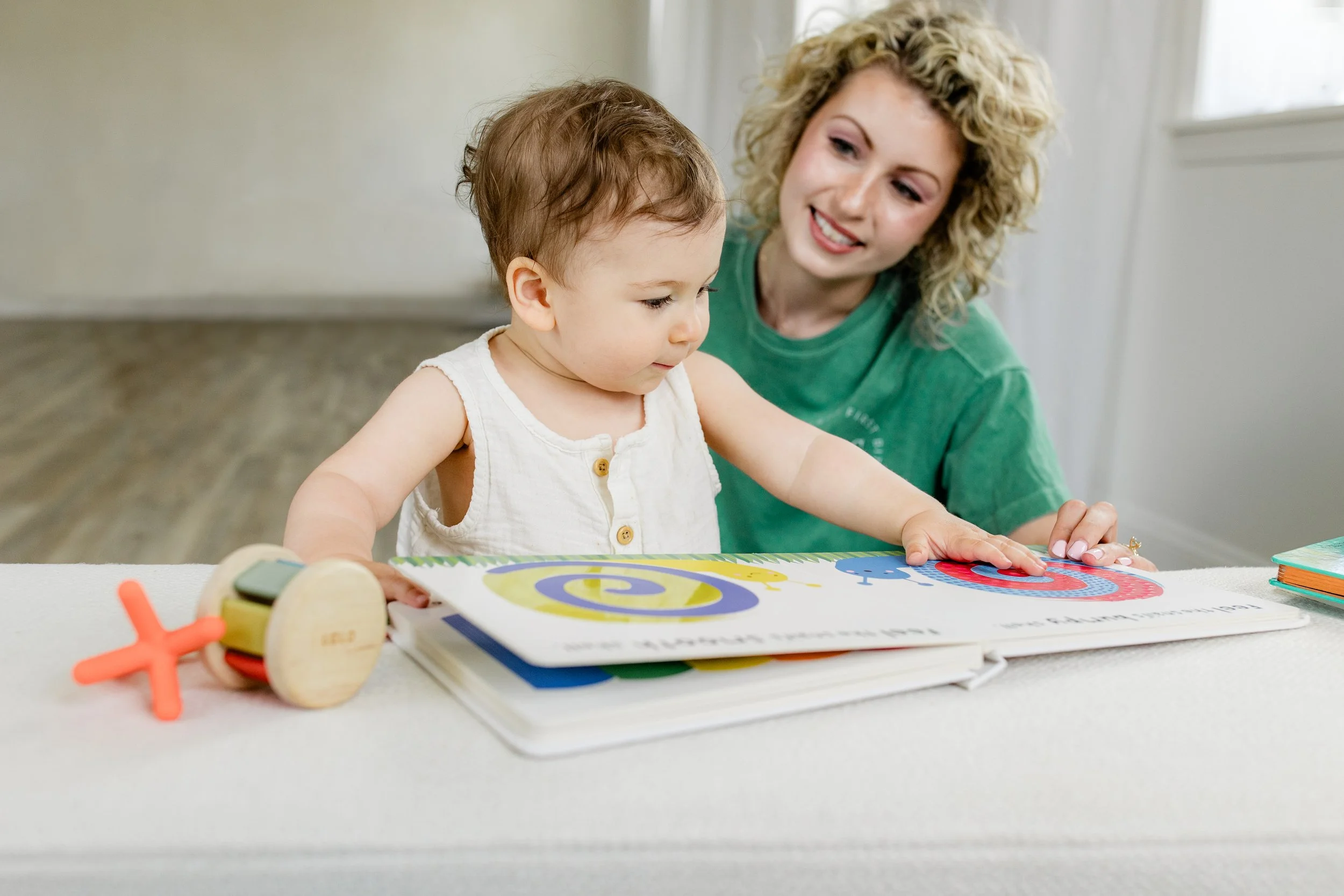
Working on First Words
Did you know that you can “work on first words” well before your little one is a year old? It’s true! These are 5 easy things you can start to do today to help littles get to their first true word:
-
Imitate everything they do.
Respond to your 3 month old’s cooing by cooing back. Imitate every smile you get. If your 5 month old is laying on the ground playing with toys like the avocado guitar, the owl, or the crinkly fish and lets out a sound, imitate that sound back to them! If they bang a toy like the pegs and hammer, bongos, or the pop n play, with their hand, you imitate their movements and keep the back-and-forth game going!
-
Sing lots and lots of songs.
Music helps with language learning as it involves the other side of your little one’s brain! Sing routine songs repeatedly and build anticipation for what comes next. Stop songs in the middle and wait for your child to react before finishing the song. Before 6 months old, babies can try to imitate your intonation pattern with vocalizations- so COOL!
-
PAUSE.
THIS IS THE MOST IMPORTANT THING YOU CAN DO! Starting from birth. If you say something to baby or make a movement, make sure you PAUSE and give them time to respond! Sometimes, you’re just not giving baby enough time and they wanted to respond or say something to you, but just weren’t given enough time! If your little one is imitating you a lot, PAUSE before you even start talking to see if baby will try to make a sound or say a word first. Oftentimes pausing is how parents can help their littles get independent with saying words.
-
Introduce sign language!
Model signs during routines like diaper changes, feedings, play, bathtime and more! Littles are way more likely to imitate body movements, gestures, and signs before they imitate words! After 6 months of age, your little one is more likely to imitate signs if they were introduced before a year! Research tells us that signs lead to spoken language, so let’s model those signs!
-
Read lots of books.
The connection between book reading and language skills is undeniable. Get your little’s hands on books early and make them apart of everyday routines. Focus on books that make noise, have texture, and motivate baby to imitate body movements and vocally.
Imitation Leads to First Words
Imitation of body movements leads to imitation of sounds, and those build on each other until baby imitates gestures and signs, and then words!
All of that imitation helps lead to baby’s first true, independent word, so if you need to focus on just one thing- let it be “hmm, what can I do to try and get my baby to imitate me?”
These toys are great for littles about 6 months- 18 months of age, and some toddlers will continue to play with these too! These all encourage imitation of motor movements and pair with functional words like “up, down, bang, boom!”
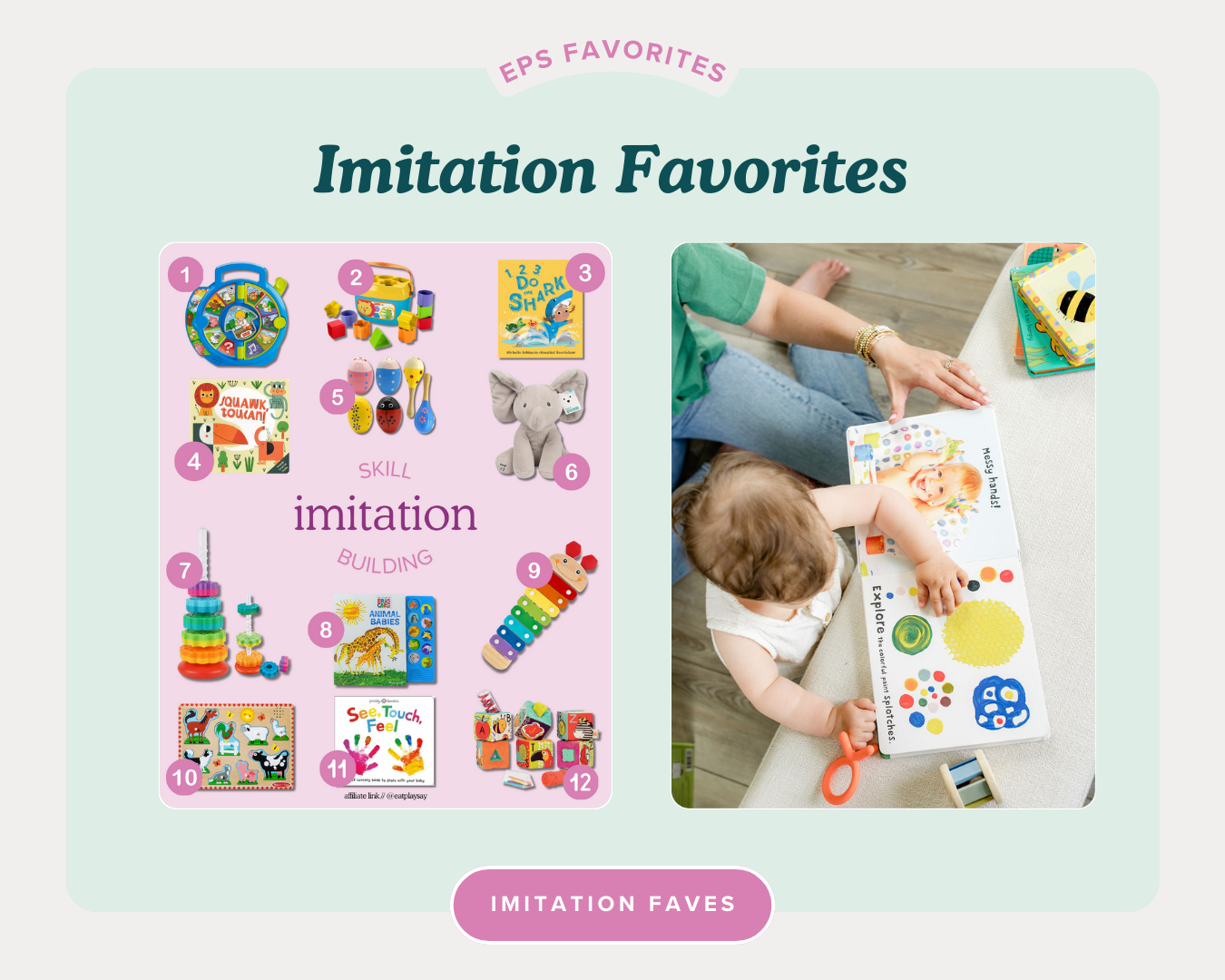
Play With Age-Appropriate Toys
Picking toys that help you model functional words for your little one is important! These lists are carefully curated and are our favorite as developmental specialists!
Toys for 9-12 months should focus on repetitive movements that leave them asking for MORE and looking to imitate both HOW you play and WHAT you say!
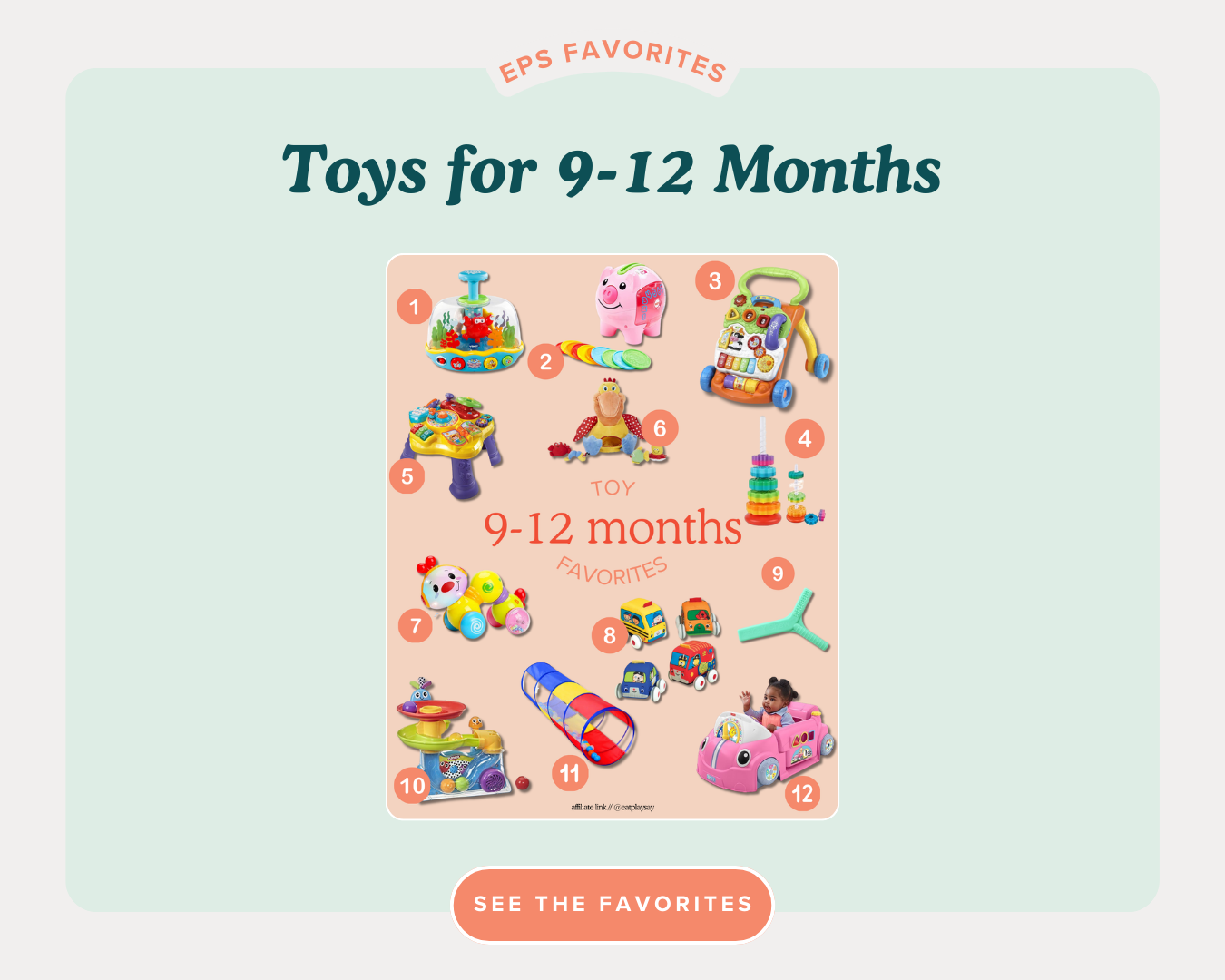
Tips to Help Baby Say Their First Word
If your little one is approaching a year of age and isn’t very vocal or imitating verbally, try not to worry. There is a LOT you can do help support them on their journey to their first word. Here are some of my favorite things to keep in mind:
-
Talk slowly and simply.
-
Say repetitive phrases and pause for them “fill in the blank.” (Baa, baa, black sheep have you any _____)
-
Pair words with gestures constantly. (“up, down, dance, yay!”)
-
Limit distractions during play (e.g., background noise, TV).
-
Introduce signs early to help bridge to spoken language.
-
Include your little one in daily repetitive tasks (e.g., laundry) and say the same words during those tasks.
-
Allow them to explore their environment, it’s ok to be quiet and see if they will say some sounds on their own!
-
Wait for them to interact with you FIRST and imitate THEM.
-
DO NOT say “say ball! Tell me ball! Say hi! What’s this? What’s that?” Keep that pressure to speak OFF and baby is more likely to say things all on their own from just hearing you model and PAUSE.
Milestones
After baby’s first birthday, introduce pretend play toys and keep modeling functional nouns and verbs for baby to imitate and eventually say independently!
We are looking for at least 10 words by 18 months, with 50% of littles saying 50 words at 18 months!
Check and see, don’t wait and see. Being aware of milestones is a GOOD thing! Yes, there is a range of normal and no two babies are alike, but if you feel like your little one might not be where they should be, it’s good to act early and seek support!
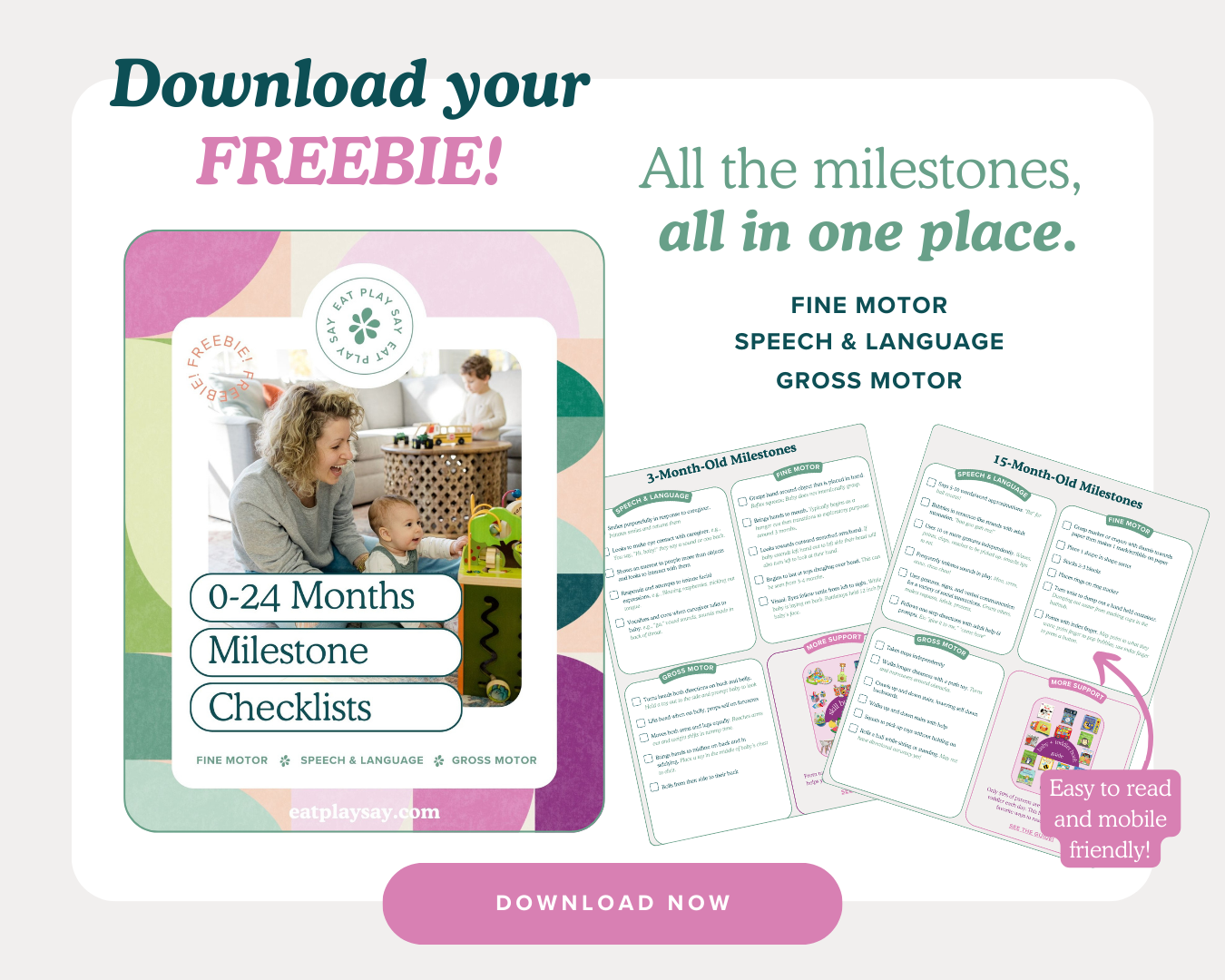
Click here for a FREE 0-24 months milestone checklist that you can download and keep close by. Reference as you need it!
All in all, it is best to get an evaluation early if you are concerned with your little one’s speech and language skills.
If your child doesn’t have a true word by the end of 12 months of age, and you’ve tried all the things in this blog, it’s time to talk to a professional! The earlier you can get support, the better. Trust your gut- you know your little one best!
Looking for More?
Check out all our favorites for littles one’s turning ONE! Learn how to support their feeding, speech-language and motor development in this free guide!





